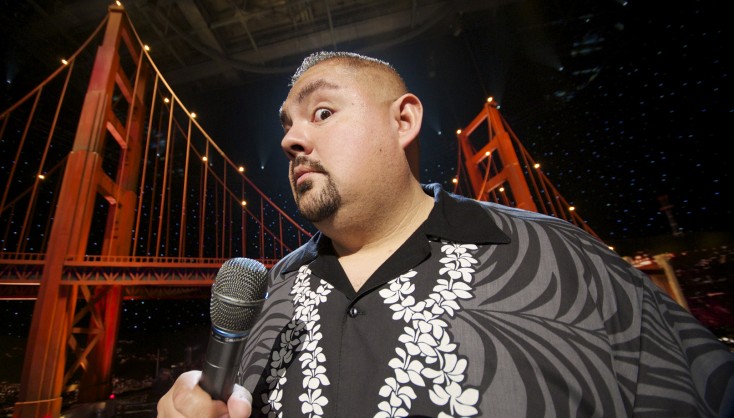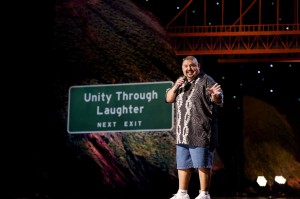By ANGELA DAWSON
Front Row Features
HOLLYWOOD—Like so many other comedians, Gabriel Iglesias’ stand up act is rooted in personal pain. Raised by his mom, the San Diego native grew up without a father. Over the years, he has struggled with weight issues and recently was diagnosed with diabetes, and yet the comedian, who grew up wanting to be Eddie Murphy, has turned those obstacles into material for his act, which has resulted in a successful career. The Mexican-American pours out his heart and soul on stage with an intended result: laughs.
His openness, not to mention his gift for recounting seminal moments of his life in a very funny way, have made him one of the most popular stand up comics around. He’s appeared in movies, including “Magic Mike,” and he has voiced characters in animated features. But stand up is his first love. Though his core fan base is Hispanic, his popularity goes well beyond any ethnic or even age group. Iglesias enjoys the sort of mass appeal that has made other Latin comedians international superstars like George Lopez, Cheech Marin, Carlos Mencia and Louis CK (who’s half Mexican).
While he has recorded other standup performances that have aired on cable TV, his new “The Fluffy Movie,” a standup comedy concert recorded earlier this year over two nights at the SAP Center stadium in San Jose, is hitting hundreds of movie screens. For the uninitiated, “fluffy” is a term Iglesias uses for his size, as in, “I’m not fat, I’m fluffy.”
In the film, which opens with a vignette about how, as a kid, he was turned on to comedy, Iglesias talks about his diagnosis and doctor-mandated weight loss, missing fast food, traveling to India to perform for the first time, being a stepfather figure to his girlfriend’s teenage son, losing his mom and meeting his estranged father, among other topics. Having shed 100 pounds by changing his diet, he admits that losing weight is a daily struggle, but he’s coping with it.
He recently spoke about making “The Fluffy Movie,” and why audiences of all shapes, colors and ages can relate to him, and why he feels more comfortable baring his soul in front of thousands of strangers than to loved ones. He also offers some advice to would-be stand ups.
Q: How did this come about?
Iglesias: I got approached a little bit after (comedian) Kevin Hart’s comedy concert films. He had two back-to-back films that did very well. They cost little to make as far as show business is concerned, but they grossed millions. (The producers at) Gulfstream Pictures saw that, and they did the calculations. What did Kevin have? A strong social media background, a strong YouTube background and so they looked around to see if anyone else has that type of credibility and connection with the fans, and that’s when my name came up. And I happen to be brown. Let’s see how this works. Hollywood is always trying to figure out how to reach Latinos. Let’s send one of them up there and see what happens. So all of that came together with the social media, the numbers, the popularity, so that’s why I got the offer to do it. I couldn’t say yes fast enough because there have only been a handful of people who’ve gotten comedy concerts.
Q: How’s your health?
Iglesias: Thanks for asking. I’m in better condition than I was a year ago so that’s a good thing. I’m not in a great place, but I’m not in a horrible place.
Q: Are you still avoiding bread?
Iglesias: If you had seen me this morning, you’d have said, “Look, he fell off the wagon.” I cut carbs out for six or seven months, and little by little, I’ve slipped. I’ve slipped a lot. Fortunately, I wasn’t trying to kick a drug habit or I’d be in an alley right now. We were at McDonald’s this morning and I’m like, “Oh God, why?” The problem is I’m allergic to wheat, not gluten. I got tested for gluten; I’m fine with gluten. Regular, everyday bread? I can eat it up. But wheat dries out my skin and my elbows, knees, hair and eyebrows.
Q: This film is a lot more emotional than your comedy specials. Why?
Iglesias: I’ve got issues, man! (He laughs.) If you’re going to do a movie, you have to make sure you separate that from what people have always been getting on cable. So I didn’t just get personal with the stories, I got very into some of the stuff that’s been happening. These are issues I’ve been sitting on for a while and I was like, “OK, do I start talking about them now or do I start talking about them later?” I figured, “Let me go for it and see what happens.” A lot of the shows I’d do, I’d talk to people afterwards and they’d say, “I like where you’re going with this. I like the fact that my son was able to hear you talking about that because it’s very relatable.” And they like that I talk about me being a stepparent because no one else talks about stepparents. Usually, stepparents get a bad rap. They’re always (portrayed) as the bad guys but there are a lot of them that are good. It’s like, finally!
Q: How do you separate yourself from what’s happened to you in your life when you’re up on stage in front of thousands of people performing?
Iglesias: Because I’ve already gone through it emotionally and got the biggest part out, talking about it makes it easier each time I tell the story. It makes it easier to handle. It’s funny because getting up in front of that many people to share stories like that I’ve got a certain level of security in that. I love opening up to strangers. I never feel like I’m being judged the way I would if I were talking to a friend or if I was talking to a relative. There’s a certain level of comfort in that. It’s funny because a lot of times, if I’m having a really bad month where I’m moody or something else is going on, my girlfriend will actually come out and attend my shows because she wants to know what’s going on in my head. She knows I’ll vent to the crowd before I’ll vent to her.
Q: Your San Francisco Bay backdrop in the movie is so elaborate. Did you have some input into that?
Iglesias: Every time I do a special I want to make it personal to wherever it is that I’m performing. When I went to Bakersfield (Calif.), I wanted to make sure the background had “Bakersfield” in it. It was the same thing with (my show in) El Paso (Texas). When I performed in Hawaii, I made sure the background was Hawaii-themed. This one, I really wanted it to say (San Francisco) Bay area. (The producers) Open Road didn’t fully agree with me on that in the beginning. They wanted it to be universal and that it appeals to everyone, but I said, “Relax, I’ve done this a few times.” (He laughs.) It’s a very iconic piece and especially with the crowd that night, I wanted to make sure that they knew it was a very personal, almost a homecoming show.
Q: How did the vignette at the beginning come about recreating your introduction standup comedy?
Iglesias: That was a tribute to my mom and to Eddie Murphy. Eddie Murphy’s “Raw” was my introduction to comedy. I always wanted to be Eddie Murphy when I was a kid. Believe it or not, the story I wanted to do was a little longer but you’ve got to work with a budget. I totally get that. So it went from a four-day shoot down to a two-day shoot. Everything totaled four days. There were two concert days and two actual film for the vignette days, and a bunch of days of editing. Shooting the concert was the easiest thing so far. All the other work that has come along with it has been hard.
Q: Your comedy crosses all demographics. What accounts for your wide appeal?
Iglesias: I think it’s great because I never wanted to be pigeonholed. I’m in it for the big picture. The fact that I can go anywhere now, even places where there are no brown faces. I went to Oslo, Norway, where everyone is as white as this table. Everybody is excited and happy and that’s an amazing feeling. At the end of day, once I’m dead and gone, hopefully people will take that and they’ll say, “Alright, he had a good idea; he had the right idea.”
Q: What advice do you have for aspiring stand up comics?
Iglesias: Work clean and talk about things that everyone in the room can relate to. Relatability is everything. In the movie, I talk about my diabetes. Half the country is overweight. Half the country is dealing with medication and issues with their health. The second thing (I talk about) is my son. Kids, family—everyone can relate to that. Fish out of water. I talk about traveling to India. I’d never been there before. So you’re talking about trying something for the first time—everyone can relate to that. Nobody told me that in the beginning; I had to figure that out myself. Be relatable. If you don’t cuss in the beginning, then you can’t offend anyone.






